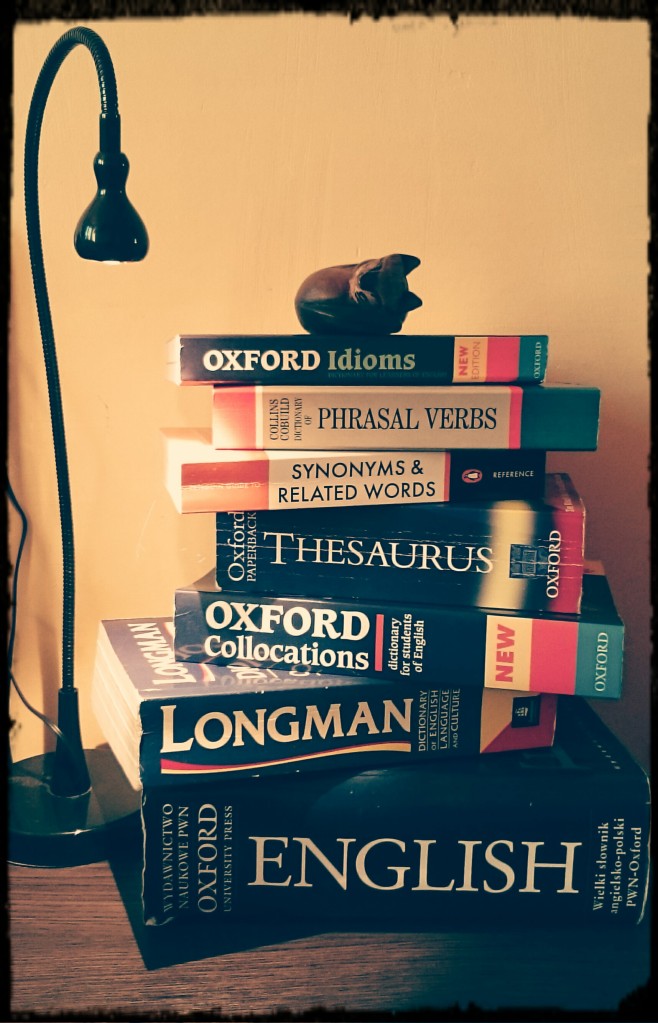How often do you use ordinary dictionaries in your classroom? Maybe, like yours truly, you are so much into technology you happen to ignore those old-fashioned tomes? Or maybe the memories of “building up your vocabulary” for Use of English exam during uni times are so traumatic you don’t even want to introduce this torture to your students?
Well, in this case you have definitely missed workshops by my colleague Beata who proved that even dictionary classes can be engaging and entertaining. Seeing my obvious disbelief, she was kind enough to lend me the book that actually made me bring my dust-covered old friends back to the classroom.
This unusual book is simply called “Dictionaries” and was written by Jonathan Wright (it’s a part of Resource Books for Teachers by OUP). It’s divided into four parts dealing with various topics in which a teacher can use a dictionary to help develop particular areas of linguistic proficiency. We start with lessons on how to actually use a dictionary (not surprising for those teachers who have already encountered students who are not really able to look for words in alphabetical order). The second part is focused on headwords – my favourite part, here you can find some interesting exercises on pronunciation and generally the phonetic system. Working with meaning deserves a separate part and it’s mainly about vocabulary development, idioms and collocations. The next part combines using dictionaries and original texts (e.g. newspaper articles) to introduce in the classroom topics like memory strategies, register, homonyms, etc. The final chapter focuses basically on vocabulary issues like differences between British and American English, connotations and vocabulary organisation.
I had been quite sceptical about this whole idea of dusting my dictionaries and bringing them to my classes (especially when we can use things like my beloved thefreedictionary), but I decided to leave my comfort zone and start this new year with some oldies but goodies. The exercises that caught my eye were as follow:
Phonemic bingo (elementary+) – develops awareness of phonemic symbols. Students make a bingo grid with e.g. 2 long vowels, 2 diphtongs, 2 short vowels and 3 consonants, then teacher dictates words and students fill in their squares.
Sight and sound (upper-intermediate+) raises awareness of onomatopoeic effects and sight/sound groups. Students look up in the dictionaries words connected with a given sound/sight and then for example, write the diary of a person with a splitting headache.
“It’s a sort of…” (elementary/intermediate) provides practice with the structure “it’s a sort of…”, superordinates and skimming. Students get a text with blanks and work on them basing on context to realize they don’t really need to know the exact meaning of each new word, but it’s enough to now what the general meaning is. I find it a really valuable exercise for my adult students who try to remember every word.
Quick quiz (elementary+) provides practice with wh- questions and helps with contextualizing new vocabulary . Students get the teacher-made quiz referring to unknown words with wh- questions (e.g. “who wears a nappy?”), and work in pairs with dictionary to solve test. It’s a really nice warm-up, or even an exercise to introduce vocabulary before a reading exercise.
Collapsing a page (preintermediate+) encourages learning vocabulary by association. Students work with a random dictionary page (10-15 headwords) and pair up as many words as they can using any justification apart from “beginning with the same letter” (e.g. two irregular plurals etc.). Then they pass their page on to the next group /pair who must guess the pairing rule.
Words and feelings (intermediate+) works with dictionary codes (e.g. derog.) and practise positive/negative connotations. Students in pairs find positive/negative connotations for simple words (fat/thin).
Find a proverb/idiom (intermediate) gives practice in finding idiomatic expressions in dictionary entries. Students get the key words that occur in proverbs/idioms and find English sayings in the dictionary.
“Would-be” vocabulary (intermediate+) focuses on the usefulness of the new vocabulary. Students work with text, find the words they don’t understand and put them in three groups: words useful for me now, words useful for me when…, words useful for me if…
Weather words and global warming (intermediate+) focuses on vocabulary development, especially weather words. Students work in groups trying to come up with cities starting with every letter of the alphabet in various continents, Then they write a weather word to go with each place, they don’t have to make sense (e.g. Fez may be “freezing”), because then they prepare a weather report for one area in the world explaining how global warming is responsible for the changes.
I hope you’ll like the ideas I found – if you want to get more, get yourself the book 🙂
Enjoy!
